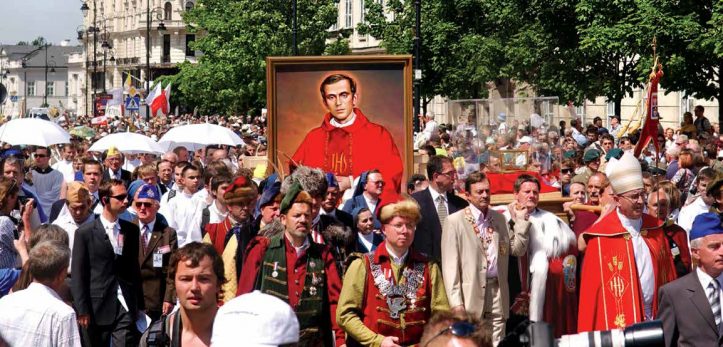Confessional state
Author: Grzegorz Kucharczyk,
"Love One Another!" 37/2016

A frequent charge made against the Church in Poland in recent times is its alleged intention to build a “confessional state” on the Vistula.

This is how liberal-leftist circles have reacted to Polish bishops reminding the public about the teaching of the Church on the sanctity of human life within the context of a recently proposed in vitro fertilisation bill. The same commentators have called the bishops’ position a “throw-back to the Middle Ages.”
This is doubly absurd. First, it confuses (on purpose?) the effect of Church teaching on human consciences (in this case, those of MPs) with direct impact on the exercising of power. Secondly, those making such charges have not noticed that over the centuries of its history, the Church — including the Church in Poland and also in the Middle Ages — on many occasions has shown its concern for the separation of two spheres: those of temporal and spiritual power. And it has paid a great price for this on more than one occasion.
The great novelty of Christianity
It may be claimed that it was the Church, faithful to the teaching of the Saviour about giving “to Caesar what is Caesar’s” and “to God what is God’s” (Matt 22:21), that was the chief promoter of this distinction. The truth about the Church’s credit for this milestone of western civilisation was recalled by St John Paul II in 1988 in his speech delivered to the European Parliament:
“After Christ, it is no longer possible to idolize society as a collective greatness that devours the human person and his inalienable des- tiny. Society, the State, and political power belong to the changing and always perfectible framework of this world. No plan of society will ever be able to establish the Kingdom of God, that is, eschatological perfection, on this earth”.
Blessed Fr Jerzy Popiełuszko recalling the words of the Apostle of Nations about “overcoming evil with good”
Proclaimed by Christianity, the distinction between “what is Caesar’s” and “what is God’s” was a complete novelty in the ancient world. Neither the Greek city-states nor Rome (republican and imperial) knew such a distinction or — as the fate of the first Christian martyrs showed — recognised it. Without exaggeration, it can be claimed that in a sense the martyrs, dying in Roman amphitheatres for objecting to the imperative of worshipping the currently reigning emperor (or his image) as god, were key witnesses to this distinction. It is also in this sense that the words of St John Paul II spoken in Włocławek in 1991 should be understood; the words that “European culture was created by the martyrs of the first three centuries.”
“No plan of society will ever be able to establish the Kingdom of God, that is, eschatological perfection, on this earth” (St John Paul II)
The overprotectiveness of temporal authority
It must be stressed that the claims of state authority to domination over the Church did not end the moment toleration for Christians was proclaimed by Emperor Constantine the Great in 313 AD (Edict of Milan). The emperor had great ambitions, by no means limited to ensuring conditions for the Church to develop normally by abandoning the policies of persecution. He considered his mission to be control over the Church on a par with the bishops, not excluding the bishop of Rome and not only in the administrative sense. To bishops gathered at the first ecumenical council in Nicaea, Emperor Constantine wrote: “You have been appointed bishops by God in matters regarding the internal life of the Church, while I have been appointed bishop in external matters.” To remind the reader, these words were written by an emperor who had not been baptised!
Thus was born the Byzantine tradition of Caesaro-papism, involving the domination of the State over the Church, later followed by emperors ruling in Constantinople (Byzantium) as their major principle of government. It was opposed by both eastern and western fathers and doctors of the Church. St Ambrose of Milan and St Augustine of Hippo (Western Church), as well as St John Chrysostom (patriarch of Constantinople, removed by force from his bishop’s see) and St Athanasius of Alexandria (also exiled several times by Byzantine emperors devoted to the Arian heresy), were all in agreement on the issue.
Distinction, not separation
The great bishops named above opposed the principle of Caesaropapism with the Catholic teaching on the relations between the State and the Church. As St Ambrose wrote in the late fourth century, “the emperor is in the Church and not above the Church. For a good emperor tries to help the Church and not oppose it.” And elsewhere: “The Church belongs to God […] and Caesar has no right to dominion over God’s temple.”
This teaching was upheld and elaborated on in the next century by the bishop of Hippo in Africa, St Augustine, who taught: “True, the emperor, although he is a man, is king over people in human matters, but there is yet another King in heavenly matters. There is one king for temporal life and another King for eternal life.” Elsewhere, he was more specific: “Even if we ask emperors for something for the benefit of the Church, we do not place our true trust in them.” Towards the end of the fifth century, the subject was addressed by the future pope, Gelasius I: “The emperor is the son and not the superior of the Church. In matters of faith, he may only learn and not teach.”
Let us note, however, that this (Catholic) interpretation of Church- State relations was more about distinction and not about separation understood as a permanent disjoining of the two institutions. The latter would mean in practice treating the state (public) sphere as by definition separated from Christian teaching. This understanding of the separation of the Church and the State, which tacitly assumes that the state (public) sphere is to be de- Christianised, was combated by the Church of the first centuries with equal fervour as the usurpations of Caesaro-papism.
Within this context, it is worthwhile quoting from a letter sent by Pope Gelasius I to the Byzantine Emperor Anastasius (494 AD):
“There are two powers, august Emperor, by which this world is chiefly ruled, namely, the sacred authority of the priests and the royal power. Of these, that of the priests is the more weighty, since they have to render an account for even the kings of men in the divine judgment. […] If the ministers of religion, recognising the supremacy granted you from heaven in matters affecting the public order, obey your laws, lest otherwise they might obstruct the course of secular affairs by irrelevant considerations, with what readiness should you not yield them obedience to whom is assigned the dispensing of the sacred mysteries of religion?”
God’s commandments are not restricted to subjects only
In short, the Church does not aspire to fulfil the duties of a secular power, but it cannot forgo its duty (“the burden resting on priests”) of teaching faith and Christian morality to all. Of course, assuming the highest authority in a state — as either an emperor or a president — does not mean that the person concerned is to repudiate his or her faith overnight and become an atheist deaf to God’s law. Almighty God speaks to every human conscience regardless of the state position occupied by an individual. This is one of the “burdens” resting on the Church, which is bound to admonish “at the right and the wrong time” (and so always) also those who exercise power.
In 390 AD, the residents of Thessalonica rebelled against the local representatives of the imperial government. In the ensuing tumult, the commander of a unit of the imperial army stationed in the city was killed. This happened during the reign of Emperor Theodosius, later by universal consent called Theodosius the Great. In 380 AD, he made Christianity the only State-endorsed religion in the entire Roman Empire and stamped out the vestiges of pagan cults. Furthermore, he stayed in close contact with the bishop of his capital city, Milan, namely St Ambrose.
On hearing of the rebellion of the Thessalonians, Emperor Theodosius, overwhelmed by rage, ordered the army to carry out mass executions. Rounded up in the city amphitheatre, the people of Thessalonica were massacred. There were about 7,000 dead. When the news of this atrocity reached Milan, St Ambrose ordered the emperor to do public penance and refrain from accepting holy sacraments until it was over. In a letter, he explained to the emperor the motives for his action: “I have written this, not in order to shame you, but that the examples of other kings may stir you to efface the taint of this offence from your kingly dignity. You will efface it by humbling your soul before God. You are a man, and it has come upon you; now conquer it. Sin is not done away but by tears and penitence.”
The emperor listened to this advice of the Doctor of the Church and performed public penance for eight months, up to the Christmas of 390 AD. Represented in the art of successive centuries, the dramatic scene in which St Ambrose, wearing pontifical robes, stops the emperor from entering Milan Cathedral to take part in the Most Holy Sacrifice is a symbol of what the Church has always stood for, namely the distinction between the secular and spiritual powers, but not their separation (or disjunction in the sense given to it by the ideology of secularism).
There have been many such scenes in the history of the universal Church and the Church in Poland. Emperor Henry IV kneeling under the walls of Canossa, St Stanisław admonishing King Boleslaus II, the Millennium Primate, Cardinal Stefan Wyszyński, declaring a hard non possumus to the usurpations of the communist authorities or Blessed Fr Jerzy Popiełuszko recalling the words of the Apostle of Nations about “overcoming evil with good” — all these events have reminded people that those in power cannot do everything.
The price for the Church’s freedom
This conviction has become one of the pillars of the civilisation that we call Western or Latin. Many a bishop and several popes have paid the highest price for adhering to it. The attitude taken by Emperor Theodosius the Great was rather the exception, not the rule.
In the sixth century, when Byzantine emperors extended their power to Italy, the imposition of the principle of the domination of secular over spiritual power threatened the Western Church. At that time, it was practically only the papacy that uncompromisingly reminded others of the distinction between what is God’s and what is Caesar’s. On many occasions, objections to the claims of secular power cost popes their freedom or even life.
Byzantine emperors, considering themselves “external bishops”, usurped the right to impose their interpretations of faith on the entire Church. Many a time, those interpretations were inconsistent with church teaching and tradition. In the middle of the fourth century, emperors succumbed to the Arian heresy and attempted to force the Bishop of Rome to accept it. They were angered by the support given by the pope to St Athanasius the Great, Patriarch of Alexandria, a tireless defender of the Catholic faith, in his struggle against Arianism.
In 355 AD, that attitude saw Pope St Liberius exiled to Thrace (today’s northern Greece) by Emperor Constantius II. That event brought a characteristic exchange between the pope and the emperor, who was known for saying that “my will is the canon”. To Constantius II’s question “Who are you to stand up for Athanasius, an ungodly man, against the world and thereby disturb the peace of the world and the Roman State?” St Liberius replied: “Although I am alone, the matter of faith is not thereby diminished.”
In 545–555 AD, Pope Vigilius was imprisoned for his refusal to condone the interference by Emperor Justinian the Great in the internal matters of the Church. An even more dramatic fate befell Pope St Martin I (649–655) who steadfastly defended the Catholic faith against the heresy of Monothelitism, supported by the ruler of Byzantium, Emperor Constans. In June 653, the bed-ridden octogenarian pope was arrested in Rome by Byzantine soldiers and on stretchers, after a three-month journey, was taken to Constantinople, where he was to be tried for “treason” by an imperial tribunal.
In accordance with the instructions they had received, the judges were in no doubt that the pope, by rejecting Monothelitism, had “betrayed” the emperor (who favoured the heresy). This was a capital offence, but the death sentence was commuted to exile to Crimea. Before that, however, the pope was publicly humiliated and ridiculed, stripped of his liturgical robes and carried naked around the city. The martyred pope prayed all the time: “Glory be to God for everything”. He did not survive his exile in Crimea, dying there on 26 September 655. Later, he was justly called a “martyr for the cause of freedom of the Western Church”, being one of the martyred builders of Western civilisation mentioned by St John Paul II.
Source: https://loamagazine.org/archive/2016/2016-37/confessional-state
The article was published with the permission from "Love One Another!" in September 2020.
Submit
your article!
Read
more articles - Free!
Need
translation jobs? Click here!
Translation
agencies are welcome to register here - Free!
Freelance
translators are welcome to register here - Free!
Subscribe
to TranslationDirectory.com newsletter - Free!
Take
part in TranslationDirectory.com poll - your voice counts!
|





